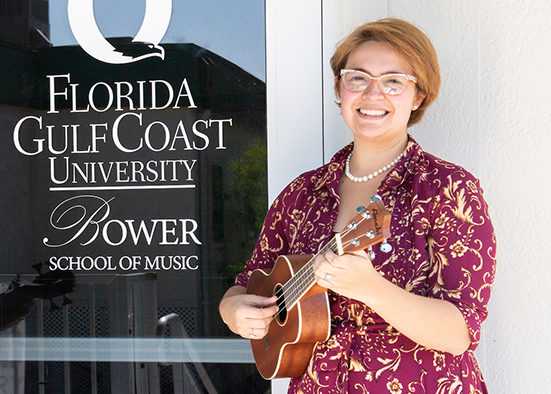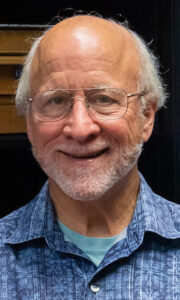A familiar tune can help stir memories of days past. Whether it’s the upbeat melody of a pop song or the soothing notes of a ballad, music has the ability to take a person back in time or to a place of significant meaning in their life.
It is through the power of music Florida Gulf Coast University graduate Marisa Luizzi connects with her clients. She is in her third year as a music therapist at the Naples Senior Center. Working in the Dementia Respite Program, she sees clients 60 and older who have been diagnosed with dementia or Alzheimer’s disease.
“There is a stigma that when it comes to Alzheimer’s and dementia, people don’t remember or they can’t do this or that,” explained Luizzi. “But the conversations that we have, the memories they bring up and the emotions that come about in our sessions, I learn so much from these people. I am so grateful to have a relationship and a connection in the way that I do.”

During the COVID-19 pandemic, Luizzi meets virtually with clients a few hours each week. The sessions are not about teaching people how to play an instrument, but using music to invoke communication or discrimination skills. According to the American Music Therapy Association, music therapy is a health profession where music is used to address physical, emotional, cognitive and social needs of individuals.
“I use their preferred music from their teen to early-adult years, and we do different cognitive activities,” Luizzi said. “The happiness and joy they get from being in music therapy — the caregivers cannot tell me enough how much it helps them.”
Luizzi’s foundation in the field was laid at FGCU when she was one of the first students to enroll in the music therapy program. She developed a love for this profession in high school and took a leap of faith after learning that a bachelor’s degree in music therapy would be offered at FGCU her sophomore year. She watched the program develop as a student.
“It was definitely a rollercoaster. When you are going into a program that is starting from the ground up, there are so many pros and cons,” Luizzi said. “For me, I always want to be a part of something that is growing or getting bigger. I wanted to be a part of something that will make a difference and make a name for itself.”

Program Director Michael Rohrbacher, Ph.D., came to FGCU in 2013 with the task of developing the new major. Support of donors and an endowment from Southwest Florida Children’s Charities helped make the program and degree a reality. This past January, it was fully approved by the National Association of Schools of Music, the accrediting body for the Bower School of Music at FGCU.
In its short history, the music therapy program has grown to help fill a significant need in the region.
“When we look at Southwest Florida, there are just a handful of music therapists that we can count,” explained Rohrbacher. “The population groups we generally serve are those with developmental disabilities, mental health needs and the elderly, as well as general medical and rehabilitation areas. If we only have five to seven music therapists throughout this region of the state, then there are population groups not being served. Fortunately, several of our graduates now live locally and are gainfully employed. Opportunities are continually expanding.”
The program has an interdisciplinary approach. In addition to courses in music, students receive clinical training as a member of a treatment team, including physical and occupational therapists, as well as clinical psychologists. Students are also required to complete a six-month full-time internship.
These field experiences, along with the FGCU curriculum, are intended to prepare graduates to sit for the national examination in music therapy administered by the Certification Board for Music Therapists, a nationally recognized credential.
“Studies in general education are foundational to our work,” said Rohrbacher. “The arts and humanities, as well as the natural and social sciences, convey the richness of human expression as starting points in determining therapeutic outcomes.”
Music therapists design music activities that benefit individuals with disabilities. Research shows this therapy can benefit patients with autism and other neurological conditions. Therapists look at the unique difficulties a person is having and determine a sequence of musical activities that will help them in a constructive manner.
“The music kind of cuts through all of the neurological difficulties. Suddenly, we might see a smile, areas of the brain are activated and glimmers of memory happen,” Rohrbacher explained. “If there’s a familiar song embedded in long-term memory, we can access that. It’s ingrained, like riding a bike.”
The connection and healing of music therapy make Luizzi passionate about her job. She encourages students with an interest in pursuing music as a career to explore the program.
“The field is so rewarding. I tell people I don’t work a day in my life and it’s true. I love what I do,” Luizzi explained. “It is such an amazing field and it is growing and evolving.”
- Learn more about the degree program.